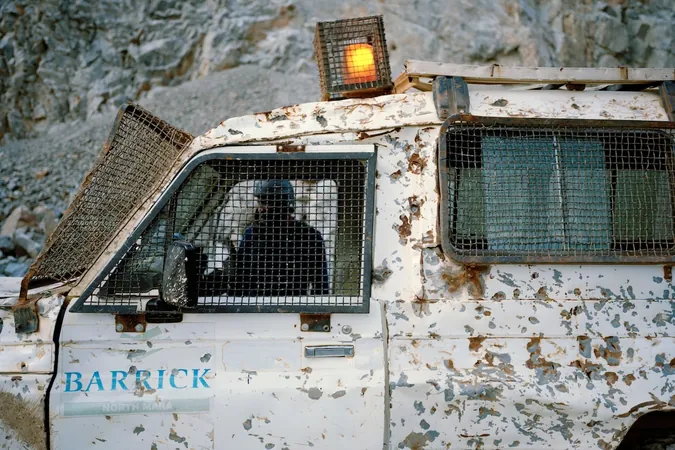
Barrick Gold's North Mara Mine: An Ominous Zone of Violence and Intrusion
2025-01-05
Author: Amelia
Introduction
In a troubling report, Barrick Gold Corp's subsidiary in Tanzania, the North Mara mine, has transformed into what the company describes as an 'armed encampment' due to rampant illegal incursions. The mine, located in the northern edge of Tanzania, has faced severe financial setbacks, with the company attributing losses in the millions of dollars to persistent invasions by local villagers, many of whom are armed with weapons such as spears and machetes.
The Conflict and Violence
Recent court documents from an Ontario Superior Court case reveal the extent of the conflict surrounding the mine. Barrick's managers provided firsthand accounts of the lawlessness that has become commonplace in the region. These affidavits indicate that villagers often clash with police, as routine tensions escalate into violence. The North Mara mine has gained a reputation as a site of constant unrest, necessitating a formidable police presence to maintain order.
Security Measures and Financial Costs
Barrick has disclosed that it pays over 150 Tanzanian police officers a daily fee to provide security within a 20-kilometer radius of the mine. Apolinary Lyambiko, the mine’s general manager, highlighted that trespassers frequently raid the site, seeking gold-bearing rock and essential mining equipment, often armed and approaching in groups.
Human Impact and Legal Issues
The conflicts have resulted in tragic and sometimes fatal outcomes. Reports indicate that scores of villagers have lost their lives due to incidents surrounding the mine, including fatalities allegedly caused by police gunfire. However, since 2019, Barrick claims to have successfully reduced the frequency of security incidents.
Human Rights Violations and Court Rulings
A recent Ontario court case was filed by local villagers who alleged severe human rights violations committed by the police, which they claim were funded and equipped by Barrick's subsidiary. This case was dismissed on procedural grounds, with the judge ordering it to be resolved in Tanzania. The plaintiffs are currently contemplating an appeal.
Barrick's Response and Legal Challenges
Adding to the controversy, Barrick's legal team described the mine site as besieged by armed intruders, necessitating extensive security measures. The mine is fortified with a 14-foot wall topped with barbed wire, yet individuals manage to breach it even at night, driven by the lure of stolen resources.
Economic Ramifications of Illegal Activities
The situation has not only tarnished Barrick's reputation but also provoked ongoing lawsuits filed in the UK concerning similar allegations. Previous cases were settled without admission of wrongdoing, further complicating the company’s standing in the international arena.
Corporate Responsibility and Local Law Enforcement
The documentations also underscore the economic ramifications of these intrusions. Illegal activities have led to significant losses, including ore worth millions of dollars, undermining Barrick’s operations and profits.
Conclusion: A Complex Intersection of Interests
In its defense, Barrick states that it does not control local police activities but acknowledges its contributions to their operations, including financial support and logistical supplies. This relationship raises critical questions about corporate influence on local law enforcement and accountability concerning human rights violations.
Sebastiaan Bock, Barrick's COO for Africa and the Middle East, confirmed the company provides daily remuneration of 100,000 Tanzanian shillings (approximately $58) for each police officer, alongside provisions such as vehicles, maintenance support, and even lodging facilities.
As police enforce security outside the mining perimeter, they maintain a presence on the site, indicating the depth of Barrick's involvement in managing the region's law enforcement dynamics. Documents suggest that Barrick has structured agreements with the Tanzanian police, reiterating the significance of this partnership amid ongoing tensions.
In essence, the North Mara mine stands at the crossroads of economic interest and human rights concerns, encapsulating a broader narrative about the mining industry’s role in politically and socially fragile regions. With ongoing challenges from villagers and legal disputes looming, the mine's future remains uncertain, and Barrick's reputation continues to hang in the balance. Will Barrick be able to navigate these treacherous waters, or are they heading for an even bigger scandal? Stay tuned for updates!



 Brasil (PT)
Brasil (PT)
 Canada (EN)
Canada (EN)
 Chile (ES)
Chile (ES)
 Česko (CS)
Česko (CS)
 대한민국 (KO)
대한민국 (KO)
 España (ES)
España (ES)
 France (FR)
France (FR)
 Hong Kong (EN)
Hong Kong (EN)
 Italia (IT)
Italia (IT)
 日本 (JA)
日本 (JA)
 Magyarország (HU)
Magyarország (HU)
 Norge (NO)
Norge (NO)
 Polska (PL)
Polska (PL)
 Schweiz (DE)
Schweiz (DE)
 Singapore (EN)
Singapore (EN)
 Sverige (SV)
Sverige (SV)
 Suomi (FI)
Suomi (FI)
 Türkiye (TR)
Türkiye (TR)
 الإمارات العربية المتحدة (AR)
الإمارات العربية المتحدة (AR)